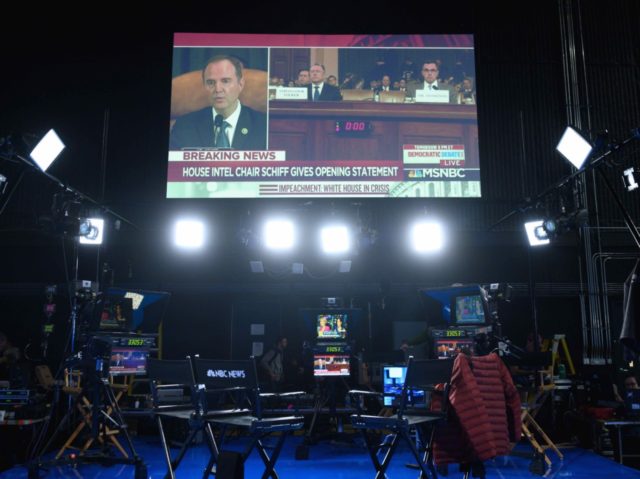The media seem not to have watched the impeachment hearings: they stopped paying attention the moment the witnesses’ prepared statements were leaked and the Democrats’ talking points were posted.
Nor did many journalists bother to read the transcripts of the witnesses’ depositions in the earlier, closed-door hearings.
Partly that was because Rep. Adam Schiff (D-CA) rushed the public hearings before some of the most important transcripts were ready. Partly that was because the sheer length of the transcripts — hundreds of pages each — was daunting for journalists working on deadline.
But partly it was because some journalists are simply lazy, and others share the Democrats’ goal of bringing down President Donald Trump by any means necessary.
That’s why the media reports of the hearings were so inaccurate. When Ambassador Gordon Sondland led off with a statement — leaked everywhere — that there had been a “quid pro quo” for a White House meeting, the media ran with that story and ignored the rest of his testimony. They hardly bothered to report that he said later he had no direct knowledge of a “quid pro quo,” and that in fact President Trump told him explicitly: “I want nothing” and “no quid pro quo.” His testimony was, in fact, exculpatory. But the media treated it as if he had proved Democrats’ case.
Or take Dr. Fiona Hill. She came into her hearing last Thursday guns blazing, declaring that Republicans on the House Intelligence Committee were guilty of denying Russian interference in the 2016 election and backing a “fictitious narrative” about Ukrainian intervention.
The media reported that — and continued reporting that even after she had been forced to back away from her position.
Republicans held up the physical evidence: a giant report on Russian interference that they themselves had approved. They also cited the mainstream media’s own reporting on Ukrainian efforts to “sabotage” Trump in 2016.
Midway through the hearing, Dr. Hill was testifying about how it seemed the Ukrainians had “bet on the wrong horse” in 2016 and that Trump’s feelings about it were understandable. But the media ignored that story, even reporting the “fictitious narrative” headline after the hearing ended. It was as if they hadn’t been watching at all.
And many weren’t.
On Wednesday afternoon, I was at the media center outside the Democrat debate in Atlanta, Georgia, co-hosted by MSNBC and the Washington Post. In the hours prior to the debate, MSNBC’s live coverage of the impeachment inquiry was showing on all the screens. Many journalists in the hall seemed not to be watching at all. They were mailing about, chatting to colleagues, or enjoying refreshments.
Some of them were top correspondents for leading media outlets — the ones who pose questions to candidates, and shape public opinion on their panel discussions and Sunday shows. Yet they were ignoring the hearings.
You can see the results in the shoddy analysis that has appeared in the days since the hearings ended. Philip Rucker of the Post, for example, wrote a story Saturday about how Republicans were still unified behind the president despite “damning” evidence.
But Rucker did not cite any of the “damning” evidence, because there wasn’t any. He cited Dr. Hill’s view on Ukraine — without noting that she later walked it back or that it was not “evidence” of anything at all.
Rucker, who seems unfamiliar with what actually happened in the depositions and the hearings, never once considered that the reason Republicans are not breaking ranks was that the Democrats’ case was so poor. Instead, he imagined that they could only be acting on political motives — or, as one anti-Trumper quoted in the article said, because they have become a “cult.”
The real “cult” are the media themselves, who have been sticking pins into Trump for more than three years, convinced that this time their fantasies will come true and he will disappear. They live in a bubble they keep re-creating for each other, completely and willfully ignorant of reality.
They ascribe the worst motives to anyone who disagrees with them without bothering to examine the evidence themselves — and insulated from the consequences of their actions. Who was fired at the Post for the “Russia collusion” hoax? (Or any number of smaller hoaxes, like the attack on the Convington High School boys?)
And what kind of journalist decides what the verdict should be before the other side has even had a chance to make its case?
Schiff and the Democrats broke from tradition and refused to let the president be represented by legal counsel, or to give Republicans near-equal control over the witness list. They held the hearings in the Intelligence Committee so they could use a secret room. Not one media company in the House press gallery bothered to sue for access — the way they sue the Trump administration for any small inconvenience, like the suspension of Jim Acosta’s press pass.
The media did not report what actually happened in the impeachment hearings, but what they want to have happened. They have enlisted themselves in a distortion of due process that threatens the constitutional rights of all Americans. If the president himself is not safe from abuse, none of us can be.
Joel B. Pollak is Senior Editor-at-Large at Breitbart News. He earned an A.B. in Social Studies and Environmental Science and Public Policy from Harvard College, and a J.D. from Harvard Law School. He is a winner of the 2018 Robert Novak Journalism Alumni Fellowship. He is also the co-author of How Trump Won: The Inside Story of a Revolution, which is available from Regnery. Follow him on Twitter at @joelpollak.

COMMENTS
Please let us know if you're having issues with commenting.